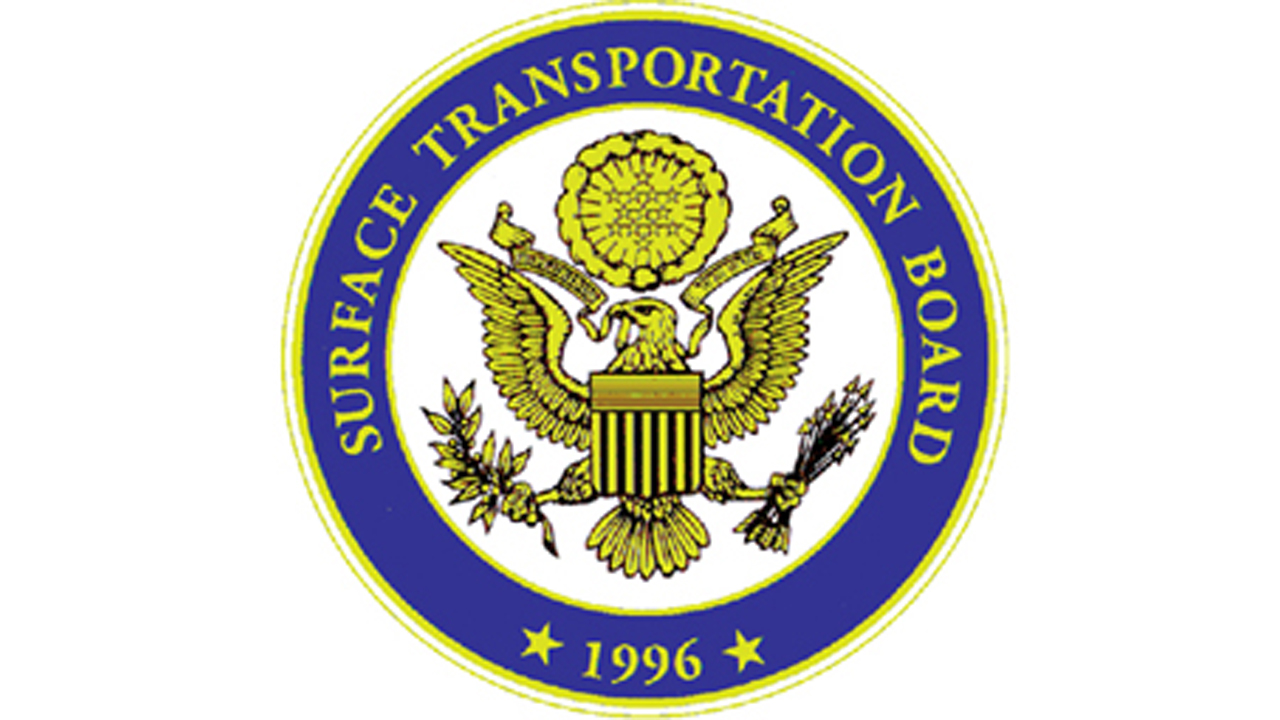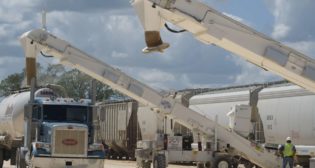
UP, AAR Take STB to Court Over ‘Final Offer Rate Review’ Rule
Written by Marybeth Luczak, Executive Editor
The U.S. Court of Appeals Eighth Circuit is hearing a case brought by Union Pacific (UP) and the Association of American Railroads (AAR) that challenges the Surface Transportation Board’s (STB) Final Offer Rate Review rule, which was adopted late last year and took effect March 6, 2023.
Under the new FORR procedure, if STB finds a rate to be unreasonable, the Board “will decide the rate by selecting either the complainant’s or the defendant’s final offer, subject to an expedited procedural schedule that adheres to firm deadlines,” the Board explained in its Dec. 19, 2022, decision.
“The Board has long sought a suitable method of making adjudication of smaller rate disputes accessible, reasonable, and less time-consuming for affected parties,” commented STB Chairman Martin J. Oberman at that time. “Experience has shown that the Board’s prior efforts to provide rate review methods suitable for smaller disputes have been rarely used by shippers.”
UP and AAR are now asking the Court to vacate the rule. Thomas Dupree Jr., a Gibson Dunn & Crutcher attorney for AAR, told the Circuit Court judges on Dec. 13, that the new process is “plainly contrary to law,” Courthouse News Service reported.
According to the railroads’ joint opening brief filed in April (download below), “Congress vested the Surface Transportation Board with authority to resolve disputes over the rates that freight railroads charge shippers and, in some circumstances, to prescribe the maximum permissible rate.” The railroads explained that in the Final Rule, “the Board announced that for certain disputes it will decide cases by conducting a baseball arbitration—that is, by using the same technique arbitrators use to determine the salaries of Major League Baseball players. The idea behind ‘Final Offer Rate Review’ is that each side makes an offer and the Board, rather than independently determining the legally correct outcome as a judge or agency adjudicator normally does, chooses one of the two offers based on a methodology the Board will not announce in advance. The Board adopted the rule by a 3-2 vote over strong dissents from two Board Members” Republican Members Patrick J. Fuchs and Michelle A. Schultz. The railroads said “the dissenters had it right” for the following three reasons: “The Board lacks statutory authority to implement this extraordinary scheme; the Board’s approach is unconstitutionally vague because parties lack fair notice of the methodology the Board will use to decide cases; and its final rule is arbitrary and capricious in many respects.”
Specifically, the railroads reported that:
- “FORR is not authorized by—and in fact conflicts with—the statutes authorizing the Board to engage in rate-setting. Congress did not give the Board authority to prescribe railroad rates using baseball-arbitration techniques, thereby confining its potential range of decisional outcomes to the two offers submitted by the parties. Rather, Congress authorized the Board to use its independent expert judgment to fix with precision the maximum rate in light of the many statutory factors and public-policy considerations Congress established to guide the Board’s determination. FORR also conflicts with the statutory requirement that parties be afforded a ‘full hearing’ before the Board may prescribe a maximum rate—that is, a hearing before an adjudicator that exercises its own independent judgment and has not announced in advance that it will only render decisions that have been proposed by one of the parties. And FORR—which resolves rate disputes using what is indisputably an arbitration technique—circumvents what the Board itself concedes is its lack of statutory authority to resolve rate cases through mandatory arbitration.”
- “FORR is unconstitutionally vague and does not provide regulated parties with fair notice of how to conform their conduct to the law. A regulation must inform ‘regulated parties … what is required of them so they may act accordingly’ … yet here the Board will not announce in advance the methodology it will use to assess the lawfulness of the railroads’ conduct. Regulated parties will not know the legal standard by which they will be judged—it could be through a historic rate assessment methodology or through a standard newly minted by one’s opponent for use in the particular case—until the Board announces its decision. While the Board’s choose-your-own-adventure approach may add excitement and unpredictability to the rate-setting process, it is not an approach faithful to constitutional principles of fair notice. Nor is it faithful to the Board’s statutory duty to maintain simplified ‘methods’ for determining the reasonableness of rates. A scheme that expressly rejects adopting any particular method cannot possibly be deemed a method itself.”
- “[T]he final rule is arbitrary and capricious for additional reasons. By adopting FORR, the Board has disabled itself from complying with the Administrative Procedure Act’s requirement that agencies engage in ‘reasoned decision-making.’ Moreover, the Board departed from its own precedent without explanation when it allowed shippers to obtain up to $4 million in relief per case. And the Board simply failed to recognize that FORR is unduly coercive because railroads and shippers do not face reciprocal risks.”
According to Courthouse News Service, “This is a case about an agency trying to do its job,” STB lawyer Drew Van Denover told the Court on Dec. 13. “‘Railroads have monopoly pricing power over shippers,’ and the original process for resolving rate disputes was too time-consuming and costly, prompting the board to streamline procedures.”
The STB in a June 2023 Court filing (download below) explained that it “is statutorily required to regulate freight rail rates paid by captive shippers. High-volume shippers of certain commodities, primarily coal and bulk chemicals, have access to rate-review procedures that are complicated and costly. But most captive shippers cannot feasibly access those procedures, and so must pay whatever rate their serving railroad charges.”
At Congress’s direction, the STB reported, “the Board has sought for decades to develop usable rate-review procedures for all businesses shipping by rail. But even the simplified procedures it has produced have proved so complex and costly that shippers find small rate cases still not worth bringing. As a result, railroads have essentially enjoyed de facto immunity from regulation with regard to many of the rates they charge their captive shippers.”
The STB explained that “Final Offer Rate Review (FORR) is a new procedure designed to remedy that problem by giving shippers a practical way to seek rate relief through accelerated procedural schedules and flexible substantive directives. It is a permissible exercise of statutory authority that represents the best chance of ensuring access to reasonable rail rates for all businesses.”
The agency reported that it “has statutory authority to select a remedy in rate cases by using final-offer procedures. The relevant statutory delegation says only that, after holding a full hearing and finding the challenged rate unreasonable, ‘the Board may prescribe the maximum rate.’” The STB noted that its “procedures allow ‘due consideration’ of the statutory criteria and any other issues presented at the ‘full hearing. ’And they meet the ‘needs of the public’ by giving shippers a remedy that Congress directed that they have.”
Additionally, STB reported that it “has substantial discretion to develop standards through adjudication rather than rulemaking. It properly exercised that discretion in relying on the statutory standard for rate reasonableness, and the railroads do not argue otherwise. The railroads do claim that the resulting rule is ‘void for vagueness,’ but precedent clearly shows that the Board had discretion to make that choice.”
Lastly, the STB reported the “final rule is reasonable and reasonably explained. The railroads provide no support for their assertion that all final-offer decision-making is inherently unreasoned, and they fail to reconcile it with the D.C. Circuit decision upholding the Board’s application of final-offer decision-making against a reasonableness challenge … In addition, the Board properly acknowledged and justified its departure from the approach it had previously used to set relief caps for simplified rate-case procedures. And the Board reasonably addressed the railroads’ arguments about ‘undue coercion,’ accommodating their concerns in substantial part and otherwise explaining that those concerns arise in any rate case and do not outweigh the public need for a workable small-rate-case procedure like FORR.”
No FORR cases have been brought since the rule became effective.
Railway Age will be following the case as it continues.
Further Reading:
AAR: FORR NPRM “Unlawful”; SMDA Should Be Limited in Scope
STB Adopts ‘Smaller Rate Dispute’ Rules
STB Arbitration Program Sidelined
![“This record growth [in fiscal year 2024’s third quarter] is a direct result of our innovative logistic solutions during supply chain disruptions as shippers focus on diversifying their trade lanes,” Port NOLA President and CEO and New Orleans Public Belt (NOPB) CEO Brandy D. Christian said during a May 2 announcement (Port NOLA Photograph)](https://www.railwayage.com/wp-content/uploads/2024/05/portnola-315x168.png)


